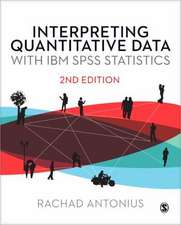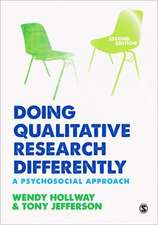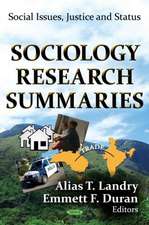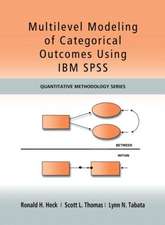Research Foundations: How Do We Know What We Know?
Autor Douglas R. Woodwellen Limba Engleză Paperback – 20 ian 2014
Preț: 409.83 lei
Preț vechi: 445.46 lei
-8% Nou
Puncte Express: 615
Preț estimativ în valută:
78.42€ • 82.10$ • 64.89£
78.42€ • 82.10$ • 64.89£
Carte tipărită la comandă
Livrare economică 07-21 aprilie
Preluare comenzi: 021 569.72.76
Specificații
ISBN-13: 9781483306742
ISBN-10: 1483306747
Pagini: 224
Dimensiuni: 152 x 229 x 14 mm
Greutate: 0.3 kg
Ediția:1
Editura: SAGE Publications
Colecția Sage Publications, Inc
Locul publicării:Thousand Oaks, United States
ISBN-10: 1483306747
Pagini: 224
Dimensiuni: 152 x 229 x 14 mm
Greutate: 0.3 kg
Ediția:1
Editura: SAGE Publications
Colecția Sage Publications, Inc
Locul publicării:Thousand Oaks, United States
Recenzii
This will be a great text for beginning master's students in research methods. I love the way the author integrates quantitative and qualitative traditions and concepts, and I appreciate tremendously the author's holistic approach.
“This book is comprehensive, covering the general philosophy of research, the methodological requirements and options, and the methods for drawing conclusions. I very much appreciate the integration of the qualitative methodologies into the general conversation of knowledge creation.”
“The author did an excellent job on this text. This text is the missing link in explaining research methodologies. His comparison/contrasts are excellent. Moreover, the author provides interesting alternatives and discusses how each alternative might improve the validity of research.”
“…With only six chapters, the text can be covered in a short time allowing for students to spend the majority of their time investigating social issues and developing research. Students who read and understand this book will have the knowledge and resources to cover material they are unfamiliar with.”
“I am looking for something just like this that is not overbearing for the student but will complement the supplementary material and resources that I am using with my students…. I am very impressed with the link between research and theory building.”
“I think the author’s emphasis on demonstrating the relationship between theory and research is terribly important and understated in so many other texts…. His accessible writing style and use of both classic and timely examples is also a strength. He is in touch with the concerns that students typically have when taking a research methods course.”
“This book is comprehensive, covering the general philosophy of research, the methodological requirements and options, and the methods for drawing conclusions. I very much appreciate the integration of the qualitative methodologies into the general conversation of knowledge creation.”
“The author did an excellent job on this text. This text is the missing link in explaining research methodologies. His comparison/contrasts are excellent. Moreover, the author provides interesting alternatives and discusses how each alternative might improve the validity of research.”
“…With only six chapters, the text can be covered in a short time allowing for students to spend the majority of their time investigating social issues and developing research. Students who read and understand this book will have the knowledge and resources to cover material they are unfamiliar with.”
“I am looking for something just like this that is not overbearing for the student but will complement the supplementary material and resources that I am using with my students…. I am very impressed with the link between research and theory building.”
“I think the author’s emphasis on demonstrating the relationship between theory and research is terribly important and understated in so many other texts…. His accessible writing style and use of both classic and timely examples is also a strength. He is in touch with the concerns that students typically have when taking a research methods course.”
Cuprins
Part I. Overview
1. Visualizing Research
Part II: Getting to Causal Theory
2. Finding and Organizing Information
3. Causal Theory
Part III. Verifying Theory
4. Preparing to Test Hypotheses
5. Testing Hypotheses
Part IV. Using Theory
6. Applying Theory and Evaluating the "Real World"
1. Visualizing Research
Part II: Getting to Causal Theory
2. Finding and Organizing Information
3. Causal Theory
Part III. Verifying Theory
4. Preparing to Test Hypotheses
5. Testing Hypotheses
Part IV. Using Theory
6. Applying Theory and Evaluating the "Real World"
Notă biografică
Descriere
This textbook shows students how knowledge is discovered through the process of research.









